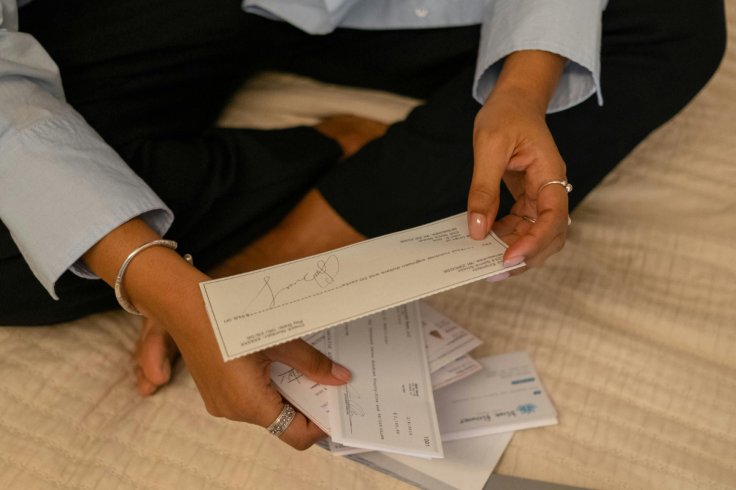Is the $600 Stimulus Check Real? The Truth About the So-Called 'Tariff Rebate' Payments
If passed, payments would likely begin in 2026, tied to 2025 tax returns.

A proposed American Worker Rebate Act has sparked widespread discussion in the United States, with claims that Americans could receive tariff rebate checks of at least £450 ($600) per adult and child.
Introduced by Senator Josh Hawley, the bill aims to redistribute revenue from President Donald Trump's tariffs on imported goods.
However, doubts persist about its feasibility and economic impact, as experts and lawmakers question whether these payments will materialise.
Origins of the Tariff Rebate Proposal
The American Worker Rebate Act, introduced on 29 July 2025, seeks to provide financial relief to American households using revenue generated from tariff revenue, which reached £20.2 billion ($27 billion) in June 2025 alone, a 301% increase from the previous year.
Senator Hawley, a Missouri Republican, proposed refundable tax credits of at least £450 ($600) per adult and dependent child, equating to £1,800 ($2,400) for a family of four.
The bill allows for larger payments if tariff revenue exceeds projections, but payments would phase out for single filers earning over £56,250 ($75,000) or joint filers above £112,500 ($150,000).
President Trump endorsed the idea, stating, 'We're thinking about that actually — we have so much money coming in, we're thinking about a little rebate,' during a press briefing on 25 July 2025.
However, the proposal remains a bill, requiring approval from both the Senate and House before reaching the President's desk.
Economic Implications and Criticisms
While the proposal aims to offset the higher prices caused by tariffs, analysts warn it could exacerbate economic challenges.
The Yale Budget Lab estimates that Trump's tariffs may cost U.S. households an average of £1,800 ($2,400) in 2025 due to increased consumer prices.
The tariff rebate checks could inject money into the economy, potentially increasing consumer spending and driving inflation, which remains around 3%.
A 2023 Federal Reserve study noted that pandemic-era stimulus contributed to a 2.6% rise in inflation, raising concerns about similar outcomes.
Critics, including MSNBC, argue that the rebates are unlikely to pass, with one report stating, 'This is not going to happen,' citing the £123 billion ($164 billion) cost and Republican reluctance for additional spending after the One Big Beautiful Bill increased deficits by £3.1 trillion ($4.1 trillion) over a decade.
Public Sentiment and Legislative Hurdles
Public reaction on social media platforms like X reflects both enthusiasm and scepticism. An X post from @ThePatriotOasis on 29 July 2025 stated, 'Senator Josh Hawley has introduced a bill that would send £450 ($600) tariff rebate checks back to Americans. What would you use the money for..??'
🚨 BREAKING - Senator Josh Hawley has introduced a bill that would send $600 tariff rebate checks back to Americans.
— The Patriot Oasis™ (@ThePatriotOasis) July 29, 2025
What would you use the money for..??
Meanwhile, @RpsAgainstTrump questioned the proposal's legality, stating, 'Josh Hawley says the legislation will send £450 ($600) tariff rebate checks to Americans, but not to "Biden voters"... How is this even legal?'
Josh Hawley says the legislation he’s proposing will send $600 tariff rebate checks to Americans, but not to “Biden voters”:
— Republicans against Trump (@RpsAgainstTrump) July 30, 2025
“This is going to the Trump blue-collar voters”
How is this even legal?
Also, rebate checks? I was reliably told that other countries pay the tariffs... pic.twitter.com/tjgtbuYWKd
Such claims, particularly about excluding certain voters, remain unverified and are not in the bill's text. The proposal faces significant obstacles, with limited support among Senate Republicans and concerns about the federal deficit, projected at £26.7 trillion ($36.7 trillion) for 2025.
If passed, payments would likely begin in 2026, tied to 2025 tax returns, but no payments are scheduled for August 2025, despite online rumours.
The American Worker Rebate Act has ignited debate about balancing tariff revenue with economic relief.
While the promise of £450 ($600) per person appeals to many, the bill's passage remains uncertain, and its economic ripple effects could pose challenges for American households already grappling with rising costs.
© Copyright IBTimes 2025. All rights reserved.



















